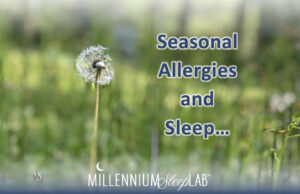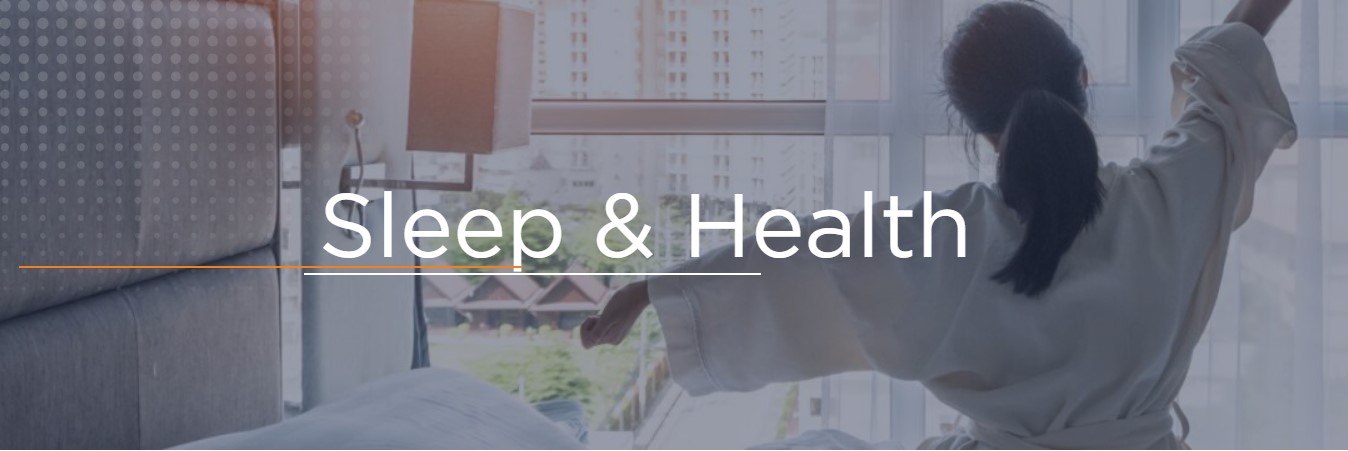Do you wonder if your snoring is more than just congestion from allergies? Do you have sleep apnea and feel sleep apnea symptoms are worse during allergy season? There is a good chance that you are experiencing more ‘apneas’ or breathing interruptions during the night. This is because your airways may be more inflamed and blocked than at other times of the year. If you are feeling more fatigued or irritable than usual, it may be a combination of seasonal allergies and obstructive sleep apnea (OSA).

How does allergic rhinitis affect my quality of your sleep?
Allergic rhinitis, or ‘hay fever’ symptoms, include sneezing, nasal congestion, runny nose and itchy eyes. It’s the nasal congestion that can be a real problem, particularly if you have sleep apnea. It means that your nose is blocked, and your mouth is likely to be dry too; both these issues can cause those sleep ‘apneas’ to occur more frequently.
Similarly, some types of allergy can cause other sorts of reactions. If tonsils and adenoids swell, the airway can become obstructed. Again, this can lead to more apneas. It’s not surprising that research has found that people with allergic rhinitis have more frequent and longer obstructive sleep apneas.
Why is the spring season particularly difficult?
During spring, the air is still cool, but days become more humid. The trees, bushes, and weeds are awakening and releasing significant pollen into the air. If you suffer from allergic rhinitis, you may find this time of year particularly difficult. You may experience an increase your allergy symptoms which can worsen your obstructive sleep apnea and causing sleep disturbances and making you more tired than usual. Don’t let your allergies get in the way of outdoor events such as weddings and family get-togethers!
Can I stop an allergy from interfering with my sleep apnea?
According to European research, treating allergies will not prevent your sleep apnea. However, studies show that treating nasal congestion with nasal steroids certainly helps people enjoy better sleep. So, it seems sensible to try to keep any seasonal symptoms under control, especially if you have sleep apnea.
What happens if I need CPAP therapy?
CPAP therapy is a common way of treating obstructive sleep apnea. CPAP therapy uses ‘continuous positive airway pressure’ to deliver a constant supply of air to your airways.
To do this, CPAP therapy users need to wear a mask so that the oxygen can reach their airways. There are a wide range of masks available. Some cover the whole face; others just cover the nose. If you suffer from nasal congestion, then a full-face mask might be a better option for you. Rather than delivering air just to the nose, the full mask covers your mouth too. This means that an air supply can reach your airways, even if your nose is blocked.
It’s a good idea to let your sleep specialist know if you have an allergy. This way, your sleep specialist can check that you have the most suitable CPAP mask or therapy. It’s also a good idea to keep any seasonal allergies under control as this may help relieve some of the nasal congestion that can also block airways.
I’ve heard that APAP might help. What is it?
APAP is another form of positive air therapy. APAP is automatic positive airway pressure. Unlike CPAP, instead of delivering a continuous supply of air, APAP adjusts the air supply, using advanced technology to sense snoring, an apnea, or if air flow is disrupted due to seasonal reactions for example.
Don’t delay getting treatment
Sleep apnea is a serious condition. Disrupted sleep can lead to daytime fatigue which can make daytime activities like driving or operating machinery dangerous. It has also been identified as a risk factor for other conditions including cardiovascular disease.
Sleep allows our bodies to rest and repair. Having a good night’s sleep is an essential part of a healthy lifestyle and vital for our physical and mental wellbeing. With advances in technology and science, sleep apnea can now be diagnosed and classified so that a suitable therapy or treatment can be devised.
If you would like to know more about sleep apnea or how it is diagnosed, contact Millennium to schedule a telemedicine appointment with one of our sleep specialists today. Sleep apnea and allergies are conditions that can be managed utilizing telehealth.
